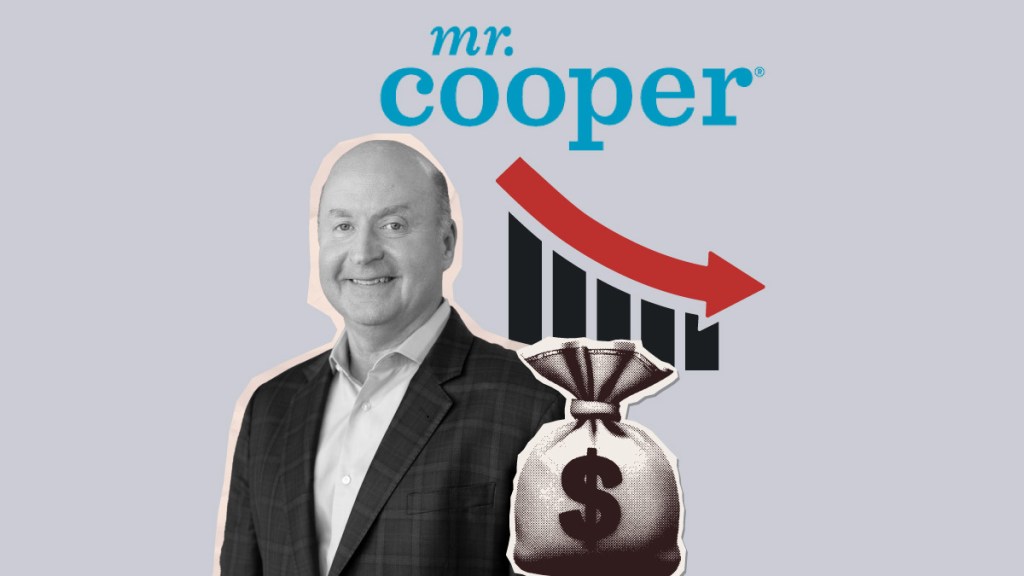Mr. Cooper Group remained profitable across its mortgage origination and servicing businesses in the second quarter of 2025, despite the loss of a major subservicing client ahead of its pending acquisition by Rocket Companies.
“The company is firing on all cylinders,” CEO Jay Bray said in a recorded earnings call. “This is a real achievement considering the difficult environment, with persistent high mortgage rates contributing to ongoing affordability challenges, sluggish home sales, and home prices coming under pressure in some markets.”
Mr. Cooper reported $198 million in net income for the quarter, up from $88 million in Q1 2025 but slightly below its $204 million profit from the same period last year.
Its servicing portfolio declined slightly to $1.509 trillion, down from $1.514 trillion during the previous quarter. This drop was largely due to the decision of a major client, United Wholesale Mortgage (UWM) to fully exit its $62 billion subservicing relationship with Mr. Cooper — $12 billion that deboarded in Q2, with the remaining $50 billion leaving in July. UWM is bringing its servicing in-house.
To offset the loss, Mr. Cooper said it expects to onboard a new $40 billion client by the end of this year, and it plans to add another $20 billion in mortgage servicing rights (MSRs) through acquisitions in Q3.
“We’ve been bidding on select bulk pools which meet our asset quality standards and return target,” Mr. Cooper President Mike Weinbach said. “Recent wins include a sizable portfolio from a major institution.”
Looking ahead, Weinbach said the company expects its servicing portfolio to remain “flat, plus or minus,” as it maintains pricing discipline and focuses on integration planning with Rocket.
Servicing performance
Mr. Cooper serviced 6.4 million customers in the second quarter, generating $332 million in pretax income — essentially flat compared to the previous quarter. Portfolio performance remained stable, with delinquencies holding at 1%. Borrowers had an average FICO score of 737 and an average loan-to-value ratio of 51% in Q2 2025.
Chief financial officer Kurt Johnson noted the company is closely monitoring the Ginnie Mae segment, particularly Federal Housing Administration (FHA) loans, which comprise 15% of the portfolio. Delinquencies in that category have risen, prompting Mr. Cooper to steer clear of the riskier 2023 and 2024 vintages.
FHA portfolio dynamics have also been affected by stricter eligibility criteria for loan modifications, which are now limited to once every 24 months.
Meanwhile, the end of the student loan moratorium may have some impact, although not materially. About 16% of Mr. Cooper’s customers carry student debt, with a delinquency rate of 7.9% in June — down from 8.7% in April. FHA borrowers with student loans represent only 3.5% of the company’s overall portfolio.
To further bolster its servicing business, Mr. Cooper launched an MSR investment fund during the quarter, securing $200 million in initial commitments.
Originations growth
Mr. Cooper’s origination segment posted $64 million in pretax income in the second quarter, up from $45 million in the first quarter. The company funded $9.4 billion across 33,051 loans, compared to $8.3 billion in volume in Q1 2025.
Of the total volume, $2.6 billion came from the direct-to-consumer (DTC) channel and $6.8 billion from the correspondent channel, where Mr. Cooper is “a top-five player and climbing,” according to Bray.
In the DTC channel, 36% of originations were cash-out refinances, followed by second liens (23%), purchase loans (21%) and rate-and-term refinances (20%). Bray said home equity products gained momentum during the quarter, supported by two securitizations.
“Our customers have, in total, more than $900 billion in available equity, which represents a massive, multiyear ramp of business for our DTC team,” Weinbach said.
“Turning to rate-and-term refinances, the opportunity in the current environment is obviously somewhat limited, but I’d point out that 22% of our customers have note rates above 6%, which positions us for sizable volumes whenever rates next rally, even if it is only briefly.”
Mr. Cooper ended the quarter with $3.8 billion in liquidity, slightly down from the prior quarter due to a bulk acquisition of MSRs.







